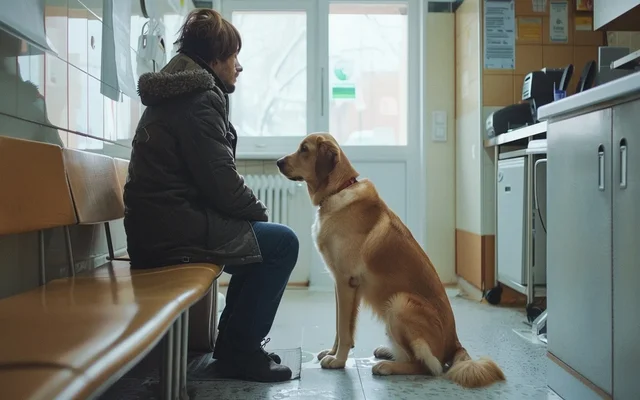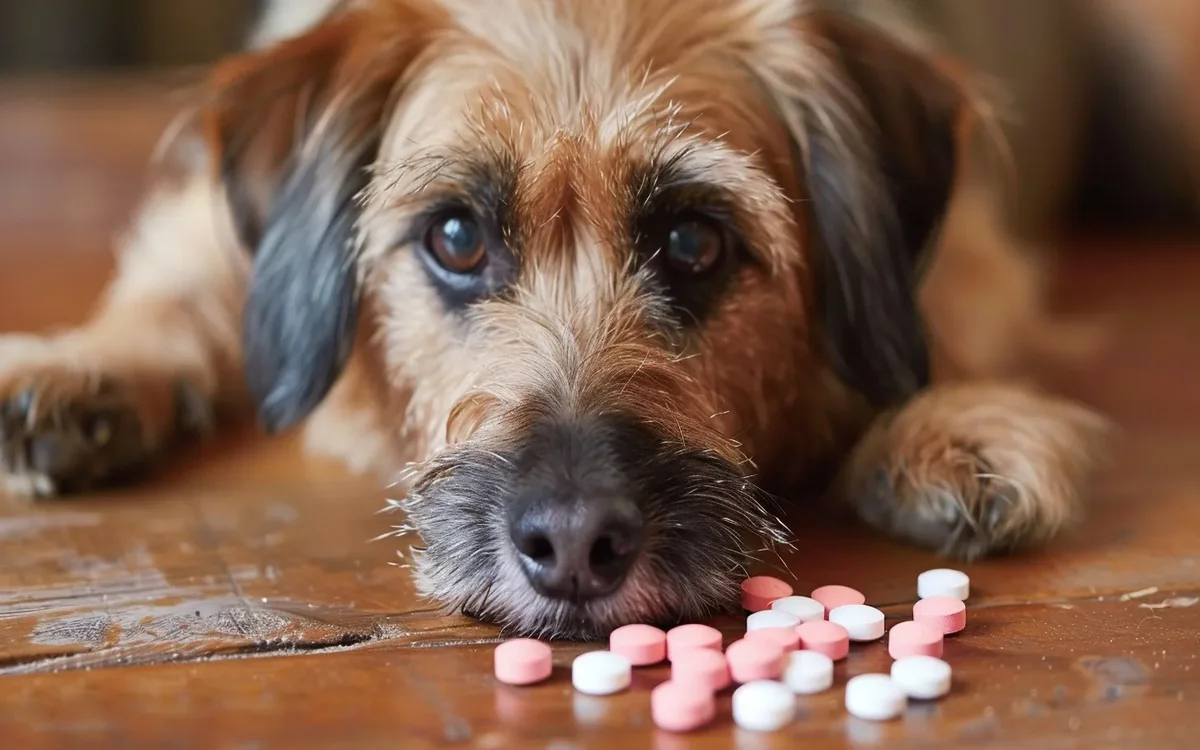Ibuprofen is toxic to dogs and should never be given to them, even in small amounts. The only exception is with explicit instructions and dosage from a veterinarian who has examined the dog. While ibuprofen is a common over-the-counter pain reliever for humans, it can cause severe health problems in dogs, including kidney failure, stomach ulcers, and difficulty breathing.
This danger is compounded by the fact that ibuprofen is so readily available. Many people keep bottles of ibuprofen (or similar pain relievers) around the house, making it easy for a dog to accidentally ingest them. If you suspect your dog has consumed ibuprofen, contact your veterinarian immediately.
Introduction
“I think my dog ate ibuprofen, but he seems fine.”
That’s the thought that probably brought you here today. As a fellow dog lover, I understand the worry that comes with the possibility of your furry friend ingesting something they shouldn’t have. Ibuprofen, a common over-the-counter pain reliever, is one of those things that can wreak havoc on your pup’s system. Even a small amount can be toxic, and in some cases, it can even be fatal. But what if your dog ate ibuprofen and is acting perfectly normal? Is there still cause for concern?
Well, the short answer is yes. While your dog might not be showing any immediate symptoms, it’s crucial to remember that ibuprofen poisoning in dogs is a sneaky beast. The signs of toxicity can be delayed, and the damage might already be happening internally.
So, if you’re asking yourself, “My dog ate ibuprofen and is fine, what should I do?”, the best course of action is to contact your veterinarian immediately. They can assess the situation, determine the risks, and advise you on the best way to proceed. Remember, when it comes to our four-legged friends, it’s always better to be safe than sorry.
In this article, we’ll delve deeper into the topic of ibuprofen poisoning in dogs, exploring the symptoms, treatment options, and preventative measures you can take to keep your canine companion safe. So, buckle up and get ready to learn everything you need to know about this common but dangerous scenario.
Symptoms of Ibuprofen Poisoning in Dogs

Spotting the signs of ibuprofen poisoning in your dog can be a bit like playing detective. Sometimes, the clues are obvious, while other times, they’re a bit more subtle. But fear not, my fellow dog lover, because we’re about to break down the most common symptoms to watch out for:
Common Symptoms:
- Vomiting: This is often one of the first signs, and the vomit may even contain blood.
- Diarrhea: Your dog’s poop might be loose, watery, or even tarry and black (a sign of digested blood).
- Loss of Appetite: Even the most enthusiastic eater might turn their nose up at their favorite kibble.
- Lethargy: If your usually energetic pup is suddenly a couch potato, it could be a red flag.
- Abdominal Pain: Your dog might whimper, groan, or seem uncomfortable when touched around their belly.
- Weakness and Wobbliness: Ibuprofen can affect coordination, making your dog unsteady on their paws.
Less Common (But Still Important) Symptoms:
- Increased Thirst and Urination: This could be a sign that ibuprofen is affecting your dog’s kidneys.
- Pale Gums: Pale gums can indicate internal bleeding or anemia, both potential complications of ibuprofen poisoning.
- Seizures: In severe cases, ibuprofen can cause neurological problems, including seizures.
Remember:
- Timing Matters: Symptoms can appear anywhere from a few hours to a few days after ingestion.
- Dosage Matters: The severity of the symptoms often depends on how much ibuprofen your dog ate.
- Individual Differences: Some dogs might be more sensitive to ibuprofen than others.
When in Doubt, Check it Out!
If your dog has ingested ibuprofen, even a small amount, don’t hesitate to call your veterinarian. It’s better to be safe than sorry. They can assess the situation and recommend the best course of action.
What to Do If Your Dog Ate Ibuprofen

Don’t Panic, But Act Fast!
Finding out your dog has eaten ibuprofen can be a real heart-stopper, but try to stay calm. The first and most important thing you need to do is contact your veterinarian or a 24/7 animal poison control hotline immediately. Time is of the essence in these situations, so don’t delay. Even if your dog seems fine, the effects of ibuprofen poisoning can be delayed, and internal damage might already be occurring.
Key Information to Have on Hand:
Before you call, gather the following information:
- The amount of ibuprofen your dog ingested: Check the bottle for the dosage and how many pills are missing.
- When your dog ate it: Be as specific as possible about the time of ingestion.
- Your dog’s weight: This will help the vet calculate the potential toxicity.
- Any pre-existing health conditions your dog has: This is important information for the vet to know.
What NOT to Do:
- Don’t induce vomiting unless instructed by a veterinarian: In some cases, vomiting can worsen the situation.
- Don’t give your dog any home remedies: Stick to the advice of your veterinarian.
- Don’t wait to see if symptoms develop: Seek help immediately, even if your dog seems fine.
At the Vet’s Office:
The veterinarian will assess your dog’s condition and recommend the best course of treatment. This may include:
- Inducing vomiting: If it’s been a short time since your dog ate the ibuprofen, the vet might induce vomiting to get rid of any remaining medication in the stomach.
- Administering activated charcoal: This can help to absorb any ibuprofen that has already been absorbed into the bloodstream.
- Providing supportive care: This may include IV fluids to protect the kidneys and medications to reduce inflammation and prevent ulcers.
- Monitoring: Your dog will likely need to stay at the vet’s office for observation and monitoring.
Aftercare at Home:
Once your dog is back home, follow your veterinarian’s instructions carefully. This may include giving your dog medications, monitoring their food and water intake, and watching for any signs of complications.
Remember, early intervention is key when it comes to ibuprofen poisoning in dogs. By acting quickly and following your veterinarian’s advice, you can give your furry friend the best chance of a full recovery.
Prognosis for Dogs Who Ate Ibuprofen

A Silver Lining: Most Dogs Recover
Let’s start with the good news: with prompt and appropriate veterinary care, the prognosis for most dogs who have ingested ibuprofen is generally good. The majority of pups who receive timely treatment will make a full recovery and go back to their playful, tail-wagging selves.
Factors Influencing Recovery:
The outcome of ibuprofen poisoning in dogs depends on a few key factors:
- Amount Ingested: The higher the dose, the more severe the potential complications.
- Time Elapsed Before Treatment: The sooner treatment is initiated, the better the chances of a full recovery.
- Individual Dog’s Health and Sensitivity: Some dogs may be more susceptible to the toxic effects of ibuprofen than others, due to factors like age, pre-existing conditions, or individual sensitivities.
- Quality of Veterinary Care: Prompt and comprehensive veterinary care is crucial for a positive outcome.
Potential Complications:
While most dogs recover fully, it’s important to be aware of the potential complications of ibuprofen poisoning:
- Gastrointestinal Ulcers: Ibuprofen can irritate the stomach lining, leading to ulcers that can cause pain, bleeding, and even perforation.
- Kidney Damage: Ibuprofen can be toxic to the kidneys, potentially causing acute kidney injury or even chronic kidney disease.
- Liver Damage: In some cases, ibuprofen can also affect the liver, leading to impaired function and potential long-term problems.
Monitoring for Long-Term Effects:
Even after your dog seems to have recovered, it’s crucial to monitor them for any long-term effects of ibuprofen poisoning. This may include regular check-ups with your veterinarian, blood tests to monitor kidney and liver function, and watching for any subtle changes in your dog’s behavior or health.
Hope and Healing:
Remember, while ibuprofen poisoning can be serious, it’s not always a death sentence for your furry friend. With prompt veterinary care and a little TLC, most dogs can bounce back from this ordeal and continue to bring joy to your life for years to come.
Conclusion

In a nutshell, ibuprofen and dogs are a dangerous mix. It’s a common household medication that’s toxic to our canine companions, even in small doses. While your dog might seem “fine” after ingesting it, don’t be fooled! Those tail wags and happy barks could be masking a brewing storm inside their body.
Remember, ibuprofen poisoning is not a DIY project. If you suspect your dog has eaten even a tiny bit of this medication, it’s crucial to contact your veterinarian or a pet poison control hotline immediately. Early intervention can be the difference between a full recovery and a devastating outcome.
As a responsible pet parent, it’s your job to keep your furry friend safe. This means being vigilant about where you store medications, educating your family members about the dangers of human drugs for pets, and being prepared to act fast if an accidental ingestion occurs.
Don’t let ibuprofen poisoning steal the joy from your dog’s life. By understanding the risks, recognizing the signs, and taking proactive measures, you can ensure your beloved companion stays healthy, happy, and out of harm’s way.
If you found this article helpful, don’t hesitate to share it with other dog owners. Let’s spread the word and protect our furry friends from this silent threat!
FAQs
My dog ate ibuprofen several hours ago and seems perfectly fine. Should I still be worried?
Yes, absolutely. Ibuprofen poisoning symptoms in dogs can be delayed, and internal damage may already be occurring even without visible signs. Contact your vet immediately for guidance.
My dog only ate a small amount of ibuprofen. Does that mean they’re safe?
No amount of ibuprofen is safe for dogs. Even a single pill can be toxic depending on the dog’s size and breed. Consult your veterinarian right away.
If my dog vomits after eating ibuprofen, does that mean the danger is over?
Vomiting can be a sign of poisoning, but it doesn’t guarantee all the ibuprofen is out of their system. Further treatment might be necessary, so veterinary consultation is still crucial.
Can the long-term effects of ibuprofen poisoning in dogs appear even after they seem to have recovered?
Yes, ibuprofen can cause subtle damage to organs like the kidneys and liver, which might not manifest immediately. Regular vet checkups are essential to monitor for any delayed effects.
What are the financial implications of treating ibuprofen poisoning in dogs?
Treatment costs vary depending on the severity of the poisoning and the required procedures. It’s best to discuss potential expenses with your veterinarian upfront.
Is there a specific type of ibuprofen that’s more dangerous for dogs than others?
All forms of ibuprofen, including tablets, capsules, and liquid formulations, are toxic to dogs. The concentration of ibuprofen in the product also influences the severity of poisoning.
Are there any home remedies I can try if my dog ate ibuprofen?
No, do not attempt any home remedies. Contact your veterinarian immediately for professional guidance and treatment.
How can I prevent my dog from accidentally ingesting ibuprofen in the future?
Store all medications, including ibuprofen, in secure, out-of-reach locations. Be mindful of purses, backpacks, and counters where medications might be left unattended.
Are there any signs that my dog might be experiencing kidney damage due to ibuprofen poisoning?
Increased thirst, frequent urination, lethargy, and decreased appetite can be signs of kidney problems. If you notice these symptoms, contact your vet immediately.
What should I expect during and after my dog’s treatment for ibuprofen poisoning?
Treatment may involve inducing vomiting, administering activated charcoal, providing fluids, and monitoring vital signs. Your vet will guide you through the recovery process and any necessary follow-up care.

I’m Ashley Fowler and dogs have always been my companions from my earliest memories. Growing up, our family dog was my confidant, adventure buddy and sometimes partner in crime (sorry mom, about the chewed shoes!). That bond sparked a lifelong passion for learning about dogs – their unique personalities, their histories, and the special ways they fit into our lives. MDogsW is my way of sharing that passion and hopefully helping others experience the joy of finding their perfect puppy. When I’m not researching dog breeds, you can usually find me hiking with my trusty Beagle by my side or curled up with a cozy blanket, a cup of tea, and a stack of dog breed books.

